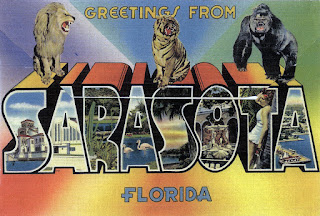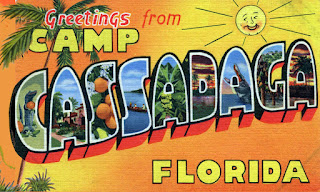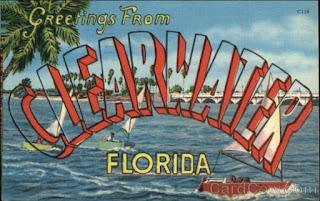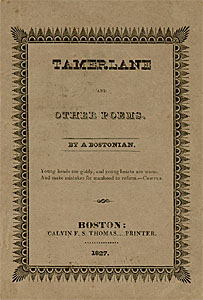Last week we peeked in on a Florida spy town and a couple of planned utopian communities. Today we’ll visit a few other curious ‘company towns’.
Celebration
No Mickey Mouse Operation
Walt Disney World is the only corporation I know that’s also a government entity greater than a township, for most purposes a Florida county, the Reedy Creek Control District. Its handpicked residents comprise a few Disney loyalists who ‘vote’ whatever needs voting on. RCCD provides the government-friendly structure for WDW and Disney controls RCCD.
Disney also built the town of Celebration. While retaining critical properties and office buildings, Disney sold houses and apartments to those who could pay, guided with an invisible three-fingered hand through its homeowners association.
Nothing is nefarious. Buyers either agree to ultra-strict rules involving their property or they buy somewhere else without an HOA.
But once upon a time, a trouble-making scofflaw was afoot. In the dark of night, a wicked, subversive rebel crept through Celebration’s oak and cypress. He ducked under well-groomed hanging moss, and planted pink plastic flamingos on neighbors manicured lawns. Plastic pink flamingos (PPF) were strictly forbidden.
The community was outraged! Worse, the PPFs seemed to breed and multiply. These crimes had to be stopped before society collapsed.
The sheriff’s department investigated. Security Officer Obie took 8x10 glossy photographs and fingerprinted the PPFs. Twice they almost captured the miserable miscreant, but the perpetrator faded into the shadows before police could turn their cars around. Terrified residents claimed a chilling voice laughed with abandon, “Mwah-ha-ha-hah.”
Early one morning the tables turned. Authorities caught the bad guy pink-handed, populating neighbors’ lawns with PPF.
Except he was also a good guy. A local minister on a mission, a pastor with a passion for challenging authority whilst having fun.
But fun is precisely how evil takes root. Prosecutors proposed a fine and the PPF reign of terror came to an end.
Holiday tip: Evenings in Celebration are a fun place to visit during the Christmas season with caroling and Disney ‘snow’. (The flakes are made from a soapy substance.)
Gibsonton
The Circus Comes to Town
In years past, baseball teams, carnivals, and circuses liked to winter in Florida. Ringling Bros and Barnum & Bailey favored the Gulf Coast. In 1927, Ringling bought property in Sarasota and the influx of circus residents influenced the look and feel of the town.
Forty-some miles distant, the ‘The World’s Strangest Couple’, 8½-feet tall Al Tomaini and his 2½-foot tall wife, Jeanie, built a camp at the hamlet of Gibsonton. They established a fire department and police department. The fledgling town became popular with so-called carney ‘freaks’ and sideshow denizens. It became a home where folks couldn’t be judged by outsiders. It developed a carnival ambiance with bright lights and tents, and a sense that residents awaited a call to the big top.
Ringling Bros and Barnum & Bailey combined shows, buying up additional land in Florida, including Haines City, where entrepreneurs built Circus World and later Boardwalk and Baseball.
Circuses no longer bore the cachet of turn-of-the-century traveling entertainment extravaganzas. Perhaps Circus World’s park was too close to Disney or too far, but various owners struggled to make a profit. Visitors can sense theme park desperation, and the Haines City projects were doomed.
Meanwhile, tourists were welcomed to visit Ringling’s Sarasota estate with its museums and entertainment venues. Perhaps the most fascinating was an extensive diorama explaining the complex operation of a traveling circus, from the advance man who visited towns arranging for an empty field, permits, water, feed, food, and other servicing, to the clean-up crew that followed the circus. It portrayed the kitchens, medical staff, the vets, the accountants and bookkeepers, housing, administration, and security. Little wonder running off to join the circus fascinated little boys.
Cassadaga
I Foresee a Town…
The town of Cassadaga calls itself the Psychic Capital of the World. The village isn’t what I expected. I don’t understand: It has road signs. Residents listen to weather reports. Posters advertise clairvoyant meetings. Hey, shouldn’t psychic citizens simply know?
Seers have no shortage of prophecies and prognostications when it comes to criminal cases. Invariably, predictions prove wrong.
In 1979, St. Cloud, Florida police relied upon Cassadaga fortune tellers rather than criminal science to assist in the homicide of a preacher's wife. They failed miserably.
In 2008, nearly ninety psychics weighed in on the search for little Caylee Anthony. Having pointed police in wrong directions, they failed miserably.
Perhaps most embarrassing was a 2001 case of missing Lillian Martin and her grandson, Joshua Bryant. Cassadaga mediums claimed…
- A trucker abducted them.
- The grandmother killed the grandson.
- The parents killed both the grandmother and the boy.
Wrong. The body of Joshua would be found three years later virtually on Cassadaga’s doorstep, the victim of a confessed killer.
The FBI and the National Center for Missing and Exploited Children maintain that to their knowledge, psychic detectives have never solved a single missing-person case, not one, not ever.
Clearwater
Imagine a secretive organization…
- infiltrating more than a hundred US government agencies, embassies, and foreign powers using 5000 or more spies and agents.
- engaging through its intelligence arm in kidnappings, burglaries, wiretapping, false imprisonment, covert surveillance, and attempted assassinations.
- declaring war on the FBI and IRS, and breaking into federal courthouses, DoJ and IRS offices.
- plotting bombings.
- framing a reporter for murder.
- framing the mayor of a Florida city for sexual impropriety and reckless/drunken driving.
- infiltrating newspapers critical of the organization.
- disappearing the wife of its beloved leader, David Miscavige.
- taking over a Florida city at the same time it declares itself a victim of persecution.
Now imagine this is no foreign power, no insidious 007 SMERSH, but instead a cult/church/corporation/criminal enterprise called Scientology. We’re talking the religion founded on a bet amongst science fiction writers, a bet gone horribly wrong.
Scientology’s internal Guardian’s Office operates as an intelligence bureau to investigate Scientology’s ‘enemies’. The FBI uncovered an astonishingly lengthy list of clandestine operations. While posing as a religion, Scientology regards its tenets and teachings as trade secrets, its symbols trademarked properties, and, unlike a real church, doesn’t hesitate to take opponents to court. The Church of Scientology (CoS) has not hesitated to use illicit and illegal means to silence its critics.
Scientology fought a ‘war’ with the IRS for recognition as a real religion, eventually overwhelming the agency with unceasing political and legal pressure, as well as infiltrating the IRS and other government bodies.
Shelly Miscavige, wife of current CEO David Miscavige has not been seen since 2006, notwithstanding a reported sighting by the National Enquirer. Former members believe she is held captive at the Church’s compound outside San Bernardino. Although not claiming to have seen her face to face, Los Angeles police believe they spoke with her by telephone.
For the past half century, Scientologists have attempted to surreptitiously take over the city and government of Clearwater. Around 2000, the ‘church’ doubled its land holdings via a thousand secret purchases through shell companies. They've bought up much of the city's waterfront. In a downtown sale of a lot, the seller chose to sell it to the city at a third of the price the 'Church' had offered. Unsurprisingly, the Church sued, claiming religious discrimination. In an attempted coup d’état, Scientologists plotted smear campaigns against the mayor in an attempt to remove him from office.
To me, the most compelling crimes inflicted by the cult of Scientology were against author Paulette Cooper. At the height (or depth) of the plots against her, Scientologists attempted to sue her and her father into bankruptcy, defame her with false accusations about pedophilia and other rumors, and ultimately frame her for bomb plots. At one point they planned to attack her (and according to one report assassinate her) outside Clearwater.
Exciting times. Rather than leave upon a sour note, Let’s visit a couple of company towns outside Florida.
Hershey, Pennsylvania
Mmm, chocolate. It’s a tasteful company town, for sure. Milton Hershey founded the town in 1903 for company workers and their families. Hershey-built homes provided the most modern amenities of the era, including electricity, indoor plumbing, and central heating. The town maintained a public trolley, free schools including a vocational school to train orphans and the underprivileged. In later years, Hershey built parks, golf courses, a community center, a sports center, a zoo, and an amusement park.
When I visited as a teenager, I took the factory tour, but the part that
stuck in my mind was the street lamps– they were shaped like Hershey
Kisses, some silvery with the tag of paper in the foil, some just
chocolate as shown in the photograph.
 |
| Naked City’s Sundial |
Naked City, Indiana
An hour south of Chicago, a pair of nudist resorts outside of Roselawn, Indiana saw the 1930s launch of a different kind of company town. At one time, the village hosted the Mister and Miss Nude pageants. The state brought obscenity charges against Naked City, which included the showing of an X-rated film, and brought about the resort’s demise. It is now called Sun Aura, which seems to have retained the famous leggy sundial sculpture (at right).
Hoosiers need not worry. Indiana has other nudist camps and colonies, including Our Haven Nature Sanctuary in the town of French Lick, which…
Hey Janice! Stop giggling. Eve! Decorum, you two. Stop it! Ladies! Behave!
















